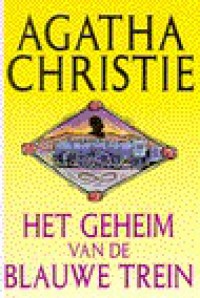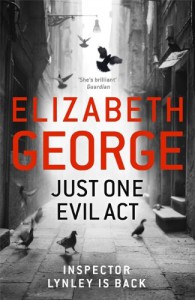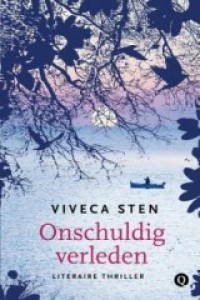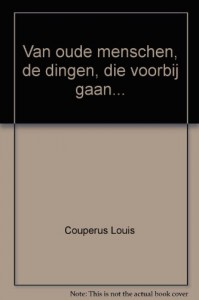Rene Hasekamp
I read books (and place a review here afterwards) in the following categories Mystery/Detective, British literature (mostly older books, from Gutenberg.org), Adventure, some Dutch lieterature and more.
My top favorite writers are John Galsworthy, Wilkie Collins, Charles Dickens, but among my five-star reviews you will also find (debuts of) contemporary writers. A recent example is Gillian Flynn. I mostly read ebooks.
Currently reading
Highly intelligentently written

This psychological thriller was written in a highly intelligent way. Three women play a role in it, and the chapters are written in the "I" form by these three women. At the beginning of the chapter it is clear who wrote this one, but it is not always clear who is "he" in that chapter. This gives the author the opportunity to put the reader on the wrong leg. And this is done cleverly . But there are more tricks to put the reader on the wrong leg. In this book nothing is what it seems, and also this aspect is cleverly used. Anyway there are many surprises and many certainties have to be reconsidered. Probably the best book I have read for years.
An important book

This is doubtless an important book. It is a very reliable account of the holocaust, because the author interviewed (be it several decades later) as many "Schindler Jews" as he still could find and were willing to tell their stories. I could at times not read more than a small number of pages, because of the many horrible events that are described. I did not give it the fifth star, because the book is written in a highly descriptive style, with not much dialogue. This makes is not easy to read.
Is it better than the film? Let me say this. The book starts earlier than the film and continues until the death of Schindler. So it contains more information about Schindler and the people around him. On the other hand, the film is a really brilliant adaptation. All essential event are included and, where necessary, slightly simplified to make them understandable to the movie visitor. You best read the book as well as see the film.
The end of Poirot

The last Poirot, and a very good one. Poirot returns to Styles, where his first case was set and invites Hastings to be there too. Poirot is hunting a serial killer, who uses very inconventional means to kill.
Poirot, who now is old and in bad health, chooses his own way to solve the case. Before he can communicate this with Hastings, Poirot dies. He appears to have left a letter for Hastings, in which everything is revealed. Probably the best Poirot. There are enough suspects and surprises to put the reader several times on the wrong leg.
Not the best Poirot

Although this is an entertaining read, near the end so many characters have been introduced, that it is near to impossible to guess who the killer is.
Furthermore Christie lets Poirot say something about the person who appears to be the killer, that makes his act very unlikely, which one would not expect from her. All taken into consideration this is not one of the best Poirots.
Schitterend boek over Nederlands-Indië

Waarschijnlijk het boek dat het leven in Nederlands-Indië het best en het mooist weergeeft. De verhouding en het onbegrip tussen Nederlanders en Javanen, de verveling, de echtelijke ontrouw, de trots van de onderdrukte Javanen en natuurlijk 'de stille kracht' .
Het boek zit goed in elkaar en alle verhaal-lijnen worden nauwgezet afgemaakt. Daar kunnen moderne auteurs nog veel van leren!
Hoewel ik zelf geen familie heb die daar geweest is, kan ik me het leven in deze kolonie nu zeer goed voorstellen. Sommige personages willen er niet meer weg, terwijl anderen de dagen tellen voor ze weer naar Nederland mogen. Prachtig beschreven.
Horror and psychology

Although it is difficult to write a review about a book, of which you have seen the two film versions two times each, this book gripped me from the first to the last page, as the movies gripped me from the first to the last frame. However, it remains unclear why the American movie ("The Vanishing") had to have a happy end. That spoils - in my opinion - the clever and highly intelligent plot of the book. Without giving much away, I can say that this small book (less than 100 pages) consists of the following parts (If you consider the next part as a spoiler, do not read on. I believe, however that I do not give anything away here that will spoil your reading pleasure): - A young couple goes on holiday in France. At a gasoline station the girl goes in to buy drinks in the shop, and never returns. - We meet in the next part a French man, who in his life has made several experiments, the latest of which is preparing to kill a young woman, by abducting her first. We follow his experiments, and at the end of this second part he appears to be the person who abducted the young woman who disappeared in part one. - Eight years later the young man seems to have accepted the events from eight years ago. - However this appears not to be the case after all, and he starts an advertising campaign in French newspapers to get to know what happened to his girlfriend. - He is then approached by the abductor. This person offers him a chance to get to know what happened to his girlfriend, but only on condition that he will undergo the same fate.
This simple story is so full of horror and psychological analysis, that it is impossible to give this small book less than five stars. It simply is brilliant.
Another page turner by Viveca Sten

From her first novel on all books by Viveca Sten are - in my opinion - absolute page turners. She always has several story lines, and every (short) chapter ends in the middle of one of them. So if you want to know how that one goes on, you have to read on several chapters. Apart from that, the plots are always good and this fifth book is no exception. What is "advertised" on the cover as the main plot appears to be a secondary one, that is in fact not even completely finished. The main plot also has several sub-plots, but they are all finished and in a satisfactory way. Although the ending is still a bit surprising, you know for a long time in which circles you have to search for the villain, but nevertheless Viveca Sten knows how to keep you by her lesson. Anyway, a good detective.
Reading progress update: I've read 33%.

Although this book is highly acclaimed, I cannot enjoy it, because of a lack of knowledge of English history. This knowledge is essential to read this book. All the historic persons make me dizzy.
I stop reading at 33%.
Best detective story ever?

"The Murder of Roger Ackroyd" was written by Agatha Christie in 1926, and (still) in 2013 it was rated by the Crime Writers Assotiation as the best detective story ever written.
And very good, and well written, it is certainly. Five stars is the only option!
Agatha Christie puts you on the wrong leg throughout the whole book, and she does this very cleverly indeed. When on one of the last pages the secret is revealed, it appears that the reader could have know it quite early in the book. At the right place she leaves a hint for the reader, but I expect that 99.9% of the readers does not see it there!
Now a few words about the story: A murder has been committed in a small village. Hercule Poirot appears to have settled there, and he is asked by one of the people close to the murdered man to help in solving the murder. In his entertaining way Poirot investigates everything that has to be investigated, in collaboration with the police and some people close to the victim. When everybody concerned has been questioned, and some things that seem not to be connected at all to the crime, have been investigated, there is the usual gathering of everybody connected to the crime. In this case Poirot - contrary to his custom - does not reveal the identity of the murderer on that gathering, but he just warns everybody that he will tell the truth to the police the next day. Why does he do so this time?
You really have to read this book. I do not tell you anything more. The book is simply brilliant. You missed a lot if you did not read this novel until now. After all, it was considered the best detective story ever, even 87 years after it was written! If you have not read it yet, what did you do all your life, as a lover of detective novels?
Good, but different from the old Lynley novels

This is the second Inspector Lynley novel in a row that I read. If you read my former review, you know why: Elizabeth George broke off one storyline at the end of the former book, and so "stimulated" het readers to buy the next one as well.
This is the next one, and if i am not wrong, it is the longest Inspector Lynley novel so far. Over 700 pages. The book consists in fact of two parts. The first problem is solved almost exactly in the middle of the book. Near its solution there are some interesting twists. Then comes the second problem. That one also has some twists, but it is not as unexpected as it looks. Especially Barbara Havers, who plays a large role in that second part, thinks in the right direction and in fact solves the mystery.
The book is mainly set in Tuscany (Italy), which is quite refreshing. In the first part Lynley plays a major part, but it is Havers again who does most of the detective work. In the whole novel Lynley in fact does not solve anything.
However, Barbara Havers, although she brings most of the problems to a solution, is balancing on the edge of what is allowed to do as a police person in this novel, and it would not have surprised me if she would have disappeared from the Lynley novels completely after this book. But this is (luckily) not what happens. Why just three stars then? To give one reason: there is no real planned murder in this book, like there was none in the former Lynley novel. If that is the new trend in these novels, I think George should reconsider this. After you finish a police novel without a real planned murder, you do not feel very satisfied. The problems in this novel are both solved and the secondary lines are correctly finished, but you are left with a bit of an anti-climax.
There are some interesting new characters in the book, such as a private detective in London, who plays his "game" not really as he should have done, and the Italian scenes are written very well. But in my opinion three stars is well rewarded for this book.
Good, but not completely satisfying

This is one more Lynley book and I liked it. The plot has many lines - as usual with Elizabeth George - and most of them are good. The main plot has some very surprising twists, and at times - while reading the book - I tended to give the book five stars. But when all the unfinished story-lines had to be finished at the end of the book, some were finished quite unsatisfactorily in my opinion. And one was not finished at all! At that time I was still willing to give four stars. However, she used this very "dirty trick" at the end of the book: she cut off one of the (quite important) story-lines, and this one is continued in the next Lynley book. When I saw this, the fourth star went and I ended up with three stars. People who like the Lynley novels will buy the next one anyway. It is a bad writing trick to start a quite important line and then abruptly cut it off. "Buy the next book if you want to know how this ends". So, the book is a good read, with some very surprising moments, but the cut-off ending was a serious disappointment to me. (I bought the next book anyway!)
Far too long

I seem to be about the only person who does not like the Cormoran Strike novels. My criticism for this one is the same as for the first one. Strike talks with dozens of people, mostly about things that hardly have to do anything with the story. Then he visits another dozen, then he visits some of them again and you wonder what all these conversations are about, as part of te story. Meanwhile there are some problems with his assistant, his brother or some other relations, and sometimes they are over again. And so te book goes on and on, without anything of any importance happening. When you have ploughed yourself through about 75% of the book, suddenly things go into the fifth break and within a few pages you know who did it, which - sadly - is not really surprising. Well, the book took me over a month to read. I had to stop every time after just a few pages because everything went soo sloow and soon I had better things to do. Lucky for most of you, you love the book and you are waiting impatiently for the next one. Happy waiting. I turn to different authors.
She does it again!

Once more Viveca Sten wrote a great page-turner.
And this one has to be awarded five stars (again) in my opinion. The story is good and the plot is quite different again from her former books.
This is book #4 of the Sandhamn series, and again we get some continuing story lines from the previous books about the private lives of Nora and Thomas, but you can read this book apart from the others without any problems. But if you are going to read them all, read them in sequence.
This time the story is set in the circles of an elite corps of the Swedish army. And this time I found it very difficult to guess anything at all of the outcome, although we get all the necessary information in the course of the book.
This time, again, there are chapters now and then of which the connection with the main plot is not obvious at first. In this books they are diary notes, written by one of the characters in the book.
There really is great progress in the writing skill of Viveca Sten, when you read the series from #1 on. In the former book, or definitely in this one, her writing has developed completely and we can expect only high quality novels from her in the future. Great reading and great plot.
Series gets better and better

This is book #3 in the Sandhamn series by Viveca Sten. I have read it in a Dutch translation, but it will doubtless also exist in your language.
Viveca Sten is definitely an upcoming talent in Scandinavian crime novels. In her third book, the best so far in the series, she gets even better than in the former two books.
A girl of around 18 years disappears, and later evidence shows that she has been murdered. So far for the plot, because I do not want to introduce spoilers in this review.
Between the chapters about the analysis of the disappearance/murder, we find chapters that are set in the past. Is there a connection with the present? You learn the answer at about two thirds of the book. As the stories go on, there appear several candidates for the murderer. The dilemma is solved near the end of the book in a confession. After that a new, but important, story line starts, that has an open end in this book.
A very interesting side of Viveca Sterns books is that some of the story lines she created in #1 of the series, continue in #2 and are further developed in #3. (And the will doubtless continue in book #4.) So this Sandhamn series is a real series, although it is possible to read every book separate without knowing the rest.
I gave #2 of the series 4 stars. Because this one is better, in my opinion, and because she has proven now to be able to at least retain the same high level throughout her books, I reward this book with five stars. There are no flaws in the plot(s) and everything is believable.
Fantastic book!

This is really a great Saga and it is not "dated" at all, although it was written in 1936. Most of you will have seen the movie. A great movie, no doubt, but to know everything about Scarlett O'Hara you need to read this fantastically written book. It won the Pulitzer Prize, by the way.
We follow Scarlett O'Hara from when she is 16, up to the time when she is 28. And around her story we get a very good impression of what the American Civil War, it's upcoming and it's aftermath meant for the Americans who lived in those years.
The story of Scarlett is written very detailed and we get to know her thoughts in detaill, as well as the thoughts of some people around her. It is not believable that anybody who reads this book is going to like Scarlett. She is portrayed as a spoiled, selfish and - in my opinion - stupid girl/young woman. She destroys everything and everybody around her if that serves het purpose. Apparently she is only interested in money and something else, which I will not mention, to keep this review free from spoilers.
In some passages she seems to become more sensible, but soon this appears only temporary, and she follows the path again that she thinks serves her purposes best.
Only two people in the book understand her and try to bring her to a better and more sensible way of life, but she seems to hate both of them. Her real feelings towards some characters are not discovered by her until the last few chapters, by the way.
Is there no criticism at all? As far as I am concerned not really. I believe that at some points the continuity is not completely correct, but who cares in such a masterpiece as this is.
An interesting detail about the writing of this book is that Margaret Mitchell wrote the final chapter first, and wrote the rest of the book, that shows why everything ends as it does, afterwards.
Anyway, I can recommend this book very strongly. It should be read by all book lovers. You won't forget it easily and you will be sorry when you have finished it.
But please do not read the existing sequels. Margaret Mitchell did not start at the end for nothing. This books shows how the story ends and that is it. Margaret Mitchell explicitly refused to write a sequel.
An e-book is available through Gutenberg Australia.
Erg mooi boek

Alles gaat natuurlijk trager in de tijd van Couperus, maar de manier waarop hij de sterk met elkaar samenhangende gebeurtenissen van drie generaties beschrijft boeit ook nog in 2014. In het leven van de oudste generatie is "een ding" gebeurd dat altijd in de familie zal blijven voortleven omdat het - ook als de direct betrokken het niet meer voort kunnen vertellen - toch zijn weg vindt naar jongere generaties. Dit "ding" wordt heel knap bij flarden steeds verder aan de lezer en aan sommigen uit de jongere generaties onthuld. Daarnaast speelt in de jongste generatie nog een probleem waarin weliswaar berust wordt, maar dat toch als een open einde blijft knagen. Al met al een erg mooi boek, dat briljant geschreven is.







